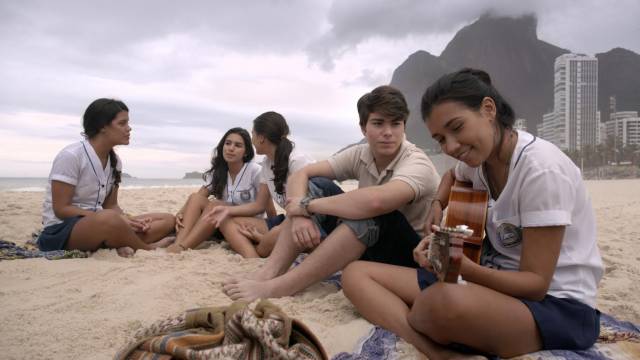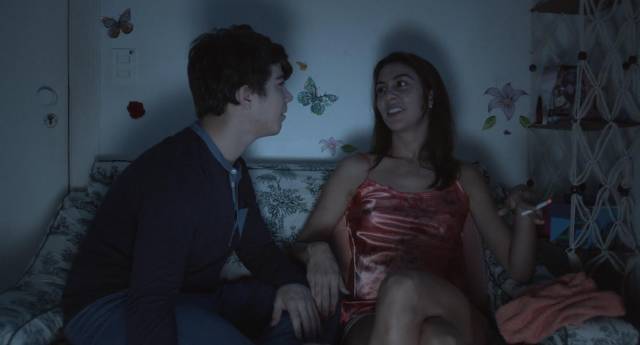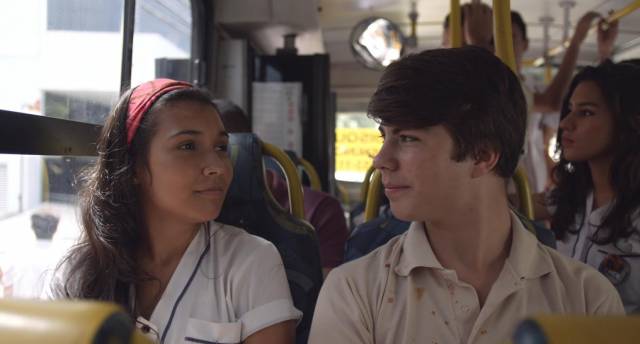
 The semi-autobiographical mixes with modern social issues in Fellipe Barbosa’s impressive, critically acclaimed feature film Casa Grande. Newcomer Thales Cavalcanti stars as Jean, a seventeen-year-old student from a wealthy family in Rio whose home life begins to unravel when his father secretly faces bankruptcy. Inspired by real events in Barbosa’s own life, the film, which also tackles modern issues of race and class, is a classical coming-of-age story about alienation and self discovery. The Brazilian native earned his MFA from Columbia University, honing his craft under the tutelage of influential filmmakers including Tom Kalin (Savage Grace) and Ira Sachs (Love is Strange). It was during his final year there that Barbosa began writing Casa Grande. We recently had the opportunity to speak with the young director in New York about working in the thriving Brazilian film industry, Russian literature, the years-long search for the right actor to play Jean and gaining strength through adversity.
The semi-autobiographical mixes with modern social issues in Fellipe Barbosa’s impressive, critically acclaimed feature film Casa Grande. Newcomer Thales Cavalcanti stars as Jean, a seventeen-year-old student from a wealthy family in Rio whose home life begins to unravel when his father secretly faces bankruptcy. Inspired by real events in Barbosa’s own life, the film, which also tackles modern issues of race and class, is a classical coming-of-age story about alienation and self discovery. The Brazilian native earned his MFA from Columbia University, honing his craft under the tutelage of influential filmmakers including Tom Kalin (Savage Grace) and Ira Sachs (Love is Strange). It was during his final year there that Barbosa began writing Casa Grande. We recently had the opportunity to speak with the young director in New York about working in the thriving Brazilian film industry, Russian literature, the years-long search for the right actor to play Jean and gaining strength through adversity.
Are you living in Brazil now?
Yes. I was in New York from 2000 to 2008. I was here for the whole Bush era, including September 11th. Once Obama took power, I went back home.
How did studying at Columbia and living in New York influence you as a filmmaker?
So much. Most of my references are from here. I did a little bit of film studies in Brazil before I transferred to Hofstra on a Fulbright scholarship. From there I went to Columbia. It was really at Columbia where most of my interests took shape. It was about experimenting, failing and failing and succeeding. By succeeding, I mean really finding the stuff that I was more naturally prone to do, more naturally able to do. Not necessarily the kind of cinema that I love the most, but what comes to me the most naturally. I guess it was an inverse process of trying to love what I do best than trying to do what I love the most. I think I connected with this classical narrative type of filmmaking that’s very ironic and empathetic and full of compassion. It’s very character driven. Columbia is very story and character driven, so that influenced me so much.
You studied directing?
Yes, but I wrote too much. Everybody writes a lot there. One of my shorts was at Sundance and then the following one was at Sundance, too. That’s how everything started. Then Casa Grande was invited to the labs there. I did everything there and then they didn’t take the movie, which was a shame.
Oh no!
But it wasn’t right when I sent it to them. I think I sent them a bad cut. I’ll live with that.
It worked out.
It worked out perfectly.
You started Casa Grande in New York?
Writing. Writing it with Karen Sztajnberg [co-writer of Casa Grande]. She was also at Columbia from Brazil, and she was one year above me.
Did you meet at Columbia?
Yes, we met here and we started writing in 2006. Right before I graduated we wrote the first draft, and then I went back home and rewrote a lot. Rewriting was a never-ending process until shooting because through rehearsals we were rewriting.
In terms of screenwriting, how do you write and how much?
Not so much. I spend a lot of time not doing anything and not judging myself for that. I’ve been rock climbing a lot in Rio. What really changed in my process from the time when I was a student to now is that I used to walk around taking notes of everything that I thought could be a scene, really not letting life flow. In a way, prostituting my life. That was really stressful and not productive.
It’s never easy, but it’s easier today because of experience, naturally. I wrote many scripts in Brazil for other directors. I basically take my time, outline it and then add in details that little by little the process can take up to two, three, four months sometimes. Then I start writing. Once I start, it’s about two weeks. Then I have a draft, but it’s a really bad one. Then rewriting begins.
What books or literature inspire you?
My biggest inspiration is always going to be the Russians. My favorite book of all time is Anna Karenina. I think Casa Grande is very inspired by Chekhov because I was doing a class on [him] at the time at Columbia, just taking extra credit in theater. I was really in love with his whole work which is really small, so I could read it all. I think there is something of that in Casa Grande. The theatricality of Chekhov.
 How long did it take to complete Casa Grande?
How long did it take to complete Casa Grande?
It was about six years of waiting until I got the money, and then once I got the money I made it quite fast. The award was announced in 2011. I received it at the end of 2012. So, March or April 2013 I shot. Then the film premiered in January 2014. Between shooting and premiering, it was nine months of gestation period.
It took awhile to cast the movie.
Yeah, because I went back to Brazil in 2008. I immediately began to research at the school where the film takes place--
Which was your school--
My school and the only school in Brazil that doesn’t take girls. It’s a very specific environment, and I wanted to have kids from there. That was a crazy rule that was really risky, but it was the most fair way of treating that place. They needed to have just finished high school because once they got into university they would be exposed to women, and they would be different already. It had to be that class. It couldn’t be younger because then they wouldn’t be the seventeen-year-old teenager. Every year I was sure I was going to get the money, so I would do the research to be ready. Then I didn’t get the money. Then the fourth year I got the money and it was this class, which was a class full of musicians. I think with every other class there were no real actors there.
Did you originally want musicians?
No, I was observing them and I realized that the ones that were the most interesting and prone to performance were the musicians. I shot a talent show that they played for themselves, just really tragic. Really talented, beautiful kids playing wonderful music and there were no girls. But I was there. I then put together a group of nine, and we did a workshop with somebody who was like a casting director/coach. Out of the nine I was undecided between four of them, [who would play Jean and his friends].
For most of the time I thought [Jean] was going to be the kid who plays the piano in the film because I recognized myself more in him. Even though I’m probably much more like [Thales Cavalcanti], but I really did not want to see it. It was a long term thing and during the process, Thales started seducing us. I always knew he was going to be in the film, but I thought he would be the sidekick-- the clown-- because he’s super funny. But when I started to do the auditions between him and Luiza [Jean’s love interest in the film played by Bruna Amaya], he was the most desperate. That was excellent for the character.
I opened the casting process to the key people in the crew and production. They are all mostly women. I mostly work with women. It was never a conscious thing, but now I understand why. My assistants, my producer, my co-producer, the casting director and coach, the art director and the DP, all of us would sit together and watch the auditions. In the beginning, they didn’t really like [Thales]. But by the end they were in love with him. I said, “This is what the film needs. This relationship between the audience and the character.” To begin resisting him but then fall in love with him.
The crew noticed their feelings for Thales had changed while he performed a scene between Jean and Luiza?
Yes.
Why?
It was the desperation.
It came out?
It came out immediately. He needed that, he was ready. [The other guys] didn’t need it. The better looking ones already had experience. They were sixteen, seventeen. They were a bit more outgoing. They were not virgins anymore. That was important. Even like, in one of the auditions [Thales] kissed one of the actresses and he was so happy about it. He was telling all his friends, “I got it!” It was amazing.
Magic happened in the casting process.
Yeah, he’s a sweet kid. He became an actor. He was doing exams for an engineering school and passed to the best one, the dream of the parents. But he couldn’t do it. He dropped out and he’s a full time actor. He’s on a big soap opera. He’s the ninth child in a family full of doctors and engineers, and the family is actually happy.
That’s incredible. You helped open a new chapter in his life. How did your family feel about being the inspiration for the film?
It was a little tense. My mother was always fully supportive. My father too, even though I could see that it was hard for him. He wouldn’t even read the script. My sister was very suspicious.
Did you share it with them from the very beginning?
Absolutely. My mom, when she read it, said it was a really great way to deal with it, therapeutically. I think she was right. My sister was a bit against it. It turns out that everybody loved it except for her.
Even now?
She said she watched it again and she liked it more. We had conversations and it was hard for her to see that portrayal. It was extremely exaggerated. It was certainly a little bit like that, I just blew it up. In a way I elaborated it for her and I think she resented that.
You shot Casa Grande at your real house?
My parent’s real house. They still live there. They can’t sell it. They’ve been trying to sell it for over ten years now.
That’s where you grew up?
No. I grew up in a middle class, normal apartment. My father got rich somewhere in between. I moved into the house when I was almost seventeen. I left when I was nineteen. Only two years and a half, but I loved it. I was so sad to leave because it was a dream house. I was finally going to be able to have a band and rehearse. But I had to come follow my dream.
That’s when you came to the US?
Yes, to study film. It was always my dream to come here to study because at the time, ‘97, ‘98, ‘99, when I decided to do this, there was no cinema in Brazil. There was one movie a year. There was no public funding. Today Brazil is funding over 100 films a year. It’s a much better time to be there. I really was lucky because now I have two movies financed. It’s the best time to be there. For me, it’s all about making movies. I’m really living my dream.
What’s it like working in the Brazilian film industry?
It feels like I’m always working with friends, it’s nice. It’s a nice community. I like that I’ve been asked to write scripts for directors a generation, or even two, above me. I really love this exchange. I really love working with people who grew up in a different time.
Jean feels embarrassed by his father's wealth. I read that you felt a similar embarrassment. How come?
It’s bourgeois guilt. It’s what the film talks about, essentially. It is uncomfortable. I think that that’s a better word. It’s really uncomfortable to have so much in a place where people have so little. It’s not cool. The film dramatizes this feeling. Almost encouraging people not to want so much because it’s not fun.
You end up isolating yourself in this bubble, completely alienated from the people you actually care about, like the maids. We like them, the affection is real. But we don’t know anything about their reality. I think that’s partially the guilt and the embarrassment. I mean, as much as I loved the house, I was a bit embarrassed to share with my friends. They would be talking. I ended up sharing with them of course, but it was always too big. Nobody has something like that. Why do I have it?
 What advice would you give Jean, or your 17 year-old-self, from your adult perspective?
What advice would you give Jean, or your 17 year-old-self, from your adult perspective?
When the crisis took place with my family, I was not a teenager anymore. I was already doing my master's. I was twenty-three, so the film is really trying to imagine these events as if I had been a teenager at the time. I think Jean must learn how to own his impotence, but it’s not an advice I could give to him. It’s something that he would learn through time.
I think making this film was a way of owning it. Owning the impotence and the naiveté and all the doubts of that age, and transforming into something that has some potency. It’s about transforming impotence into potency. The film is really about this kid who’s sleepwalking through life and then he wakes up near the end. It’s a way of owning his failures, too, and using them as an obstacle to grow, to move forward. Instead of having the obstacles and the failures bring him down.
It’s necessary to go through difficult times in life. By facing hardships, people grow.
Exactly. How could I have learned something today had it not been for the experiences I had?
Casa Grande is now playing in theaters and on Fandor.